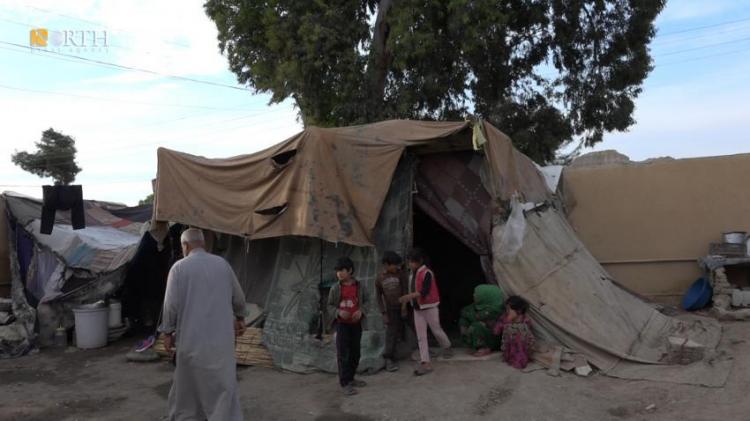Raqqa- Mustafa al-Khalil
North-Press Agency
In an ad-hoc camp in al-Kasrat area, 4 km south of the city of Raqqa, Jazia al-Raja ignites firewood an hour before Iftar so she will be able to cook their Iftar meal consisting only zucchini which her daughters got during their work for a wage not exceeding 200 Syrian pounds per one hour in the agricultural fields adjacent to the camp.
Al-Raja has no way to cook other than firewood. Her financial situation is deteriorating, and she says that she has not receives any aid or support from anybody.
The woman, her husband, and nine daughters had been displaced, nearly three years ago, from the city of Maadan, 65 km east of the city of Raqqa, to reside in al-Maqas camp with about 40 other people who had been displaced at various times from the city of Maadan and the countryside of the eastern city of Hama.
IDPs from many parts of Syria reside in Raqqa and its countryside. Some of them reside in ad-hoc camps within the tents they built at their own expense, while the Autonomous Administration in North and East Syria with Raqqa Civil Council supervises the rest of the camps.
Before the outbreak of the war in Syria, Mousa al-Shankher, residing in al-Maqas camp, lived in his village Mughla Kabira 52 km east of Raqqa and worked on his farmland, where his “financial situation was good and stable at that time," he says.
Because of the war and the succession of military groups, al-Shankher was forced to leave his home and land with a number of residents of his area that is currently under the control of the Syrian government forces, where he found shelter in a tent in al-Maqas, in which he, his wife, and his nine daughters and reside. Three of his daughters are working in the fields of neighboring agricultural lands for a low-wage that is not enough to support the family.
There are more than 55 random camps in Raqqa countryside, which include more than 15,000 families from different Syrian regions. The largest of these camps is al-Hokomia camp that connects to al-Hatash and Hazima camps north of the city of Raqqa, and consists of more than 1,100 families mostly from the western and eastern countrysides of Deir ez-Zor, in addition to IDPs from the eastern countryside of Aleppo and other Syrian regions.
In this dire situation, Mohammed Mufdi was unable to heal his two young children, one of which had a hearing problem.
He says: "Two years ago, I did not get any assistance. Everything is expensive, the organizations come to us and photograph us and only give promises."
Al-Mufdi was displaced from his village of Arshouni to Raqqa, 10 km east of the city of Salamiya in the eastern countryside of Hama, seven years ago, and moved to several places in the countryside of Raqqa until he settled in a tent in al-Maqas camp with his family consisting of his wife, eight girls, and two boys.
"I was a worker in my village, I was comfortable with peace of mind. There was no war, no fleeing, and no displacement at the time."
Al-Mufdi does not currently have any fixed financial income that helps him and his family to manage their living, except that two of his daughters work on agricultural lands in the al-Kasrat area. If available, rarely, he finds an opportunity to work as a daily wageworker.
Thuraya al-Kawan, the co-chair of the People's Assembly in al-Kasrat, told North-Press that the al-Kasrat Council has provided everything that it can for the IDPs, and that their role is limited to managing the affairs of the organizations because they do not interfere with the mechanism of distributing aid, as the organizations have their own criteria for providing aid.
She pointed out that many of the IDPs in the al-Kasrat area, including the residents of al-Maqas camp, received aid from the People Organization, a non-governmental organization concerned with supporting civil society in Raqqa, five months ago.
Al-Kawan added: "Everything that is provided by the organizations goes to the IDPs, but the organizations do not have job opportunities for the residents or for the displaced."
In the whole area of al-Kasrat, located on the right bank of the Euphrates River opposite the city of Raqqa which extends from the village of al-Sahl, 11 km west of Raqqa, to the village of Ratla, 11 km east of Raqqa, about 1,000 families displaced from different Syrian areas reside in several random camps, the same as the displaced in the al-Maqas random camp.
International organizations and local societies operating in Raqqa provide humanitarian aid to displaced people, in addition to the assistance provided through the local councils of the Civil Democratic Administration in Raqqa, according to the People’s Assembly in al-Kasrat.

